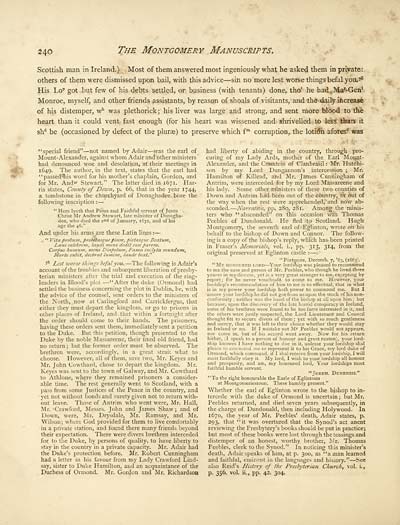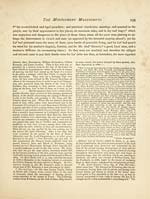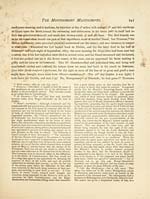Montgomery manuscripts
(254) Page 240
Download files
Complete book:
Individual page:
Thumbnail gallery: Grid view | List view

240
The Montgomery Manuscripts.
Scottish man in Ireland.) Most of them answered most ingeniously what he asked them in private:
others of them were dismissed upon bail, with this advice — sin no more lest worse things befal you. 7 s
His Lo p got but few of his debts settled, or business (with tenants) done, tho' he had Ma r -Gen'
Monroe, myself, and other friends assistants, by reason of shoals of visitants, and the daily increase
of his distemper, w h was plethorick; his liver was large and strong, and sent more blood to the
heart than it could vent fast enough (for his heart was wissened and shrivelled to less than it
sh d be (occasioned by defect of the plurae) to preserve which f m corruption, the lotion afores d was
"special friend" — not named by Adair — was the earl of
Mount- Alexander, against whom Adair and other ministers
had denounced woe and desolation, at their meetings in
1649. The author, in the text, states that the earl had
"passed^his word for his mother's chaplain, Gordon, and
for Mr. Andw Stewart." The latter died in 1671. Har-
ris states, County of Down, p. 66, that in the year 1 744,
a tombstone in the churchyard of Donaghadee bore the
following inscription : —
"Here lyeth that Pious and Faithful servant of Jesus
Christ Mr Andrew Stewart, late minister of Donagha-
dee, who died the 2nd of January, 1671, and of his
age the 46."
And under his arms are these Latin lines : —
. " Vita probu 111, probitasque pimn, pictasqite Beaium,
Laus txlebrem, lintdi mens dcdit esse parem.
Corpus Jnimum, jiwns Diapoluin, Fama inclyta mundufa,
Morte subit, decorat lumine, taude beat"
? 8 Lest worse things befal you. — The following is Adair's
account of the troubles and subsequent liberation of presby-
terian ministers after the trial and execution of the ring-
leaders in Blood's plot — "After the duke (Ormond) had
settled the business concerning the plot in Dublin, he, with
the advice of the counsel, sent orders to the ministers of
the North, now at Catiingford and Carrickfergus, that
either they must depart the kingdom, or go to prisons in
other places of Ireland, and that within a fortnight after
the order should come to their hands. The prisoners,
having these orders sent them, immediately sent a petition
to the Duke. But this petition, though presented to the
Duke by the noble Massareene, their fixed old friend, had
no return ; but the former order must be observed. The
brethren were, accordingly, in a great strait what to
choose. However, all of them, save two, Mr. Keyes and
Mr. John Cowthard, chose to depart the kingdom. Mr.
Keyes was sent to the town of Galway, and Mr. Cowthard
to Athlone, where they remained prisoners a consider-
able time. The rest generally went to Scotland, with a
pass from some Justices of the Peace in the country, and
yet not without bonds and surety given not to return with-
out leave. Those of Antrim who went were, Mr. Hall,
Mr. Crawford, Messrs. John and James Shaw; and of
Down, were, Mr. Drysdale, Mr. Ramsay, and Mr.
Wilson; where God provided for them to live comfortably
in a private station, and found there many friends beyond
their expectation. There were divers brethren interceded
for to the Duke, by persons of quality, to have liberty to
stay in the country in a private capacity. Mr. Adair had
the Duke's protection before. Mr. Robert Cunningham
had a letter in his favour from my Lady Crawford Lind-
say, sister to Duke Hamilton, and an acquaintance of the
Duchess of Ormond. Mr. Gordon and Mr. Richardson
had liberty of abiding in the country, through pro-
curing of my Lady Ards, mother of the Earl Mount-
Alexander, and the Countess of Clanbrasil : Mr. Hutchi-
son by my Lord Dungannon's intercession ; Mr.
Hamilton of Killead, and Mr. James Cunningham of
Antrim, were interceded for by my Lord Massareene and
his lady. Some other ministers of these two counties of
Down and Antrim had been out of the country, or out of
the way when the rest were apprehended, and now ab-
sconded. — Narrative, pp. 280, 2S1. Among the minis-
ters who "absconded" on this occasion was Thomas
Peebles of Dundonald. He fled to Scotland. Hugh
Montgomery, the seventh earl of Eglinton, wrote on his
behalf to the bishop of Down and Connor. The follow-
ing is a copy of the bishop's reply, which has been printed
in Fraser's Memorials, vol. i., pp. 313, 314, from the
original preserved at Eglinton castle : —
"Portmore, Decemb. 7, '63,(1663).
"My honoured lord — Your lordship was pleased to recommend
to me the case and person of Mr. Peebles, who though he lived three
yeares in my diocese, yet is a very great stranger to me, ex-cepting by
report ; for he never vouchsafd. to come to me. However, your
lordship's recommendation of him to me is so effectual, that in what
is in my power your lordship hath power to command me. But I
assure your lordship he did not goe from us upon the stock of his non-
conformity ; neither was the hand of the bishop at all upon him ; but
because, upon the discovery of the late horrid conspiracy in Ireland,
some of his brethren were found to be too farre interested in it, and
the others were justly suspected, the Lord Lieutenant and Council
thought fitt to secure divers of them ; yet with so much gentleness
and mercy, that it was left to their choice whether they would stay
in Ireland or no. If I mistake not Mr Peebles would not appeare,
nor come in, but of his accord went away. Now for his return
hither, (I speak to a person of honour and great reason), your lord-
ship knowes I have nothing to doe in it, unlesse your lordship shal
please to command me to represent it to his Grace, my lord duke of
Ormond, which command, if I shal receive from your lordship, I will
most faithfully obey it. My lord, I wish to your lordship all honour
and prosperity, and am, my honoured lord, Your lordships most
faithful humble servant.
"Jerem. Dunensis."
"To the right honourable the Earle of Eglintoun
at Montgomeriestoun. These humbly present."
Whether the earl of Eglinton wrote to the bishop to in-
tercede with the duke of Ormond is uncertain; but Mr.
Peebles returned, and died seven years subsequently, in
the charge of Dundonald, then including Holywood. In
1670, the year of Mr. Peebles' death, Adair states, p.
293, that "it was overtured that the Synod's act anent
reviewing the Presbytery's books should be put in practice;
but most of these books were lost through the tossings and
distemper of an honest, worthy brother, Mr. Thomas
Peebles, clerk to the Synod." In noticing this minister's
death, Adair speaks of him, at p. 300, as "a man learned
and faithful, eminent in the languages and history." — See
also Reid's History of the Presbyterian Church, vol. i.,
p. 356. vol. ii., pp. 42. 304.
The Montgomery Manuscripts.
Scottish man in Ireland.) Most of them answered most ingeniously what he asked them in private:
others of them were dismissed upon bail, with this advice — sin no more lest worse things befal you. 7 s
His Lo p got but few of his debts settled, or business (with tenants) done, tho' he had Ma r -Gen'
Monroe, myself, and other friends assistants, by reason of shoals of visitants, and the daily increase
of his distemper, w h was plethorick; his liver was large and strong, and sent more blood to the
heart than it could vent fast enough (for his heart was wissened and shrivelled to less than it
sh d be (occasioned by defect of the plurae) to preserve which f m corruption, the lotion afores d was
"special friend" — not named by Adair — was the earl of
Mount- Alexander, against whom Adair and other ministers
had denounced woe and desolation, at their meetings in
1649. The author, in the text, states that the earl had
"passed^his word for his mother's chaplain, Gordon, and
for Mr. Andw Stewart." The latter died in 1671. Har-
ris states, County of Down, p. 66, that in the year 1 744,
a tombstone in the churchyard of Donaghadee bore the
following inscription : —
"Here lyeth that Pious and Faithful servant of Jesus
Christ Mr Andrew Stewart, late minister of Donagha-
dee, who died the 2nd of January, 1671, and of his
age the 46."
And under his arms are these Latin lines : —
. " Vita probu 111, probitasque pimn, pictasqite Beaium,
Laus txlebrem, lintdi mens dcdit esse parem.
Corpus Jnimum, jiwns Diapoluin, Fama inclyta mundufa,
Morte subit, decorat lumine, taude beat"
? 8 Lest worse things befal you. — The following is Adair's
account of the troubles and subsequent liberation of presby-
terian ministers after the trial and execution of the ring-
leaders in Blood's plot — "After the duke (Ormond) had
settled the business concerning the plot in Dublin, he, with
the advice of the counsel, sent orders to the ministers of
the North, now at Catiingford and Carrickfergus, that
either they must depart the kingdom, or go to prisons in
other places of Ireland, and that within a fortnight after
the order should come to their hands. The prisoners,
having these orders sent them, immediately sent a petition
to the Duke. But this petition, though presented to the
Duke by the noble Massareene, their fixed old friend, had
no return ; but the former order must be observed. The
brethren were, accordingly, in a great strait what to
choose. However, all of them, save two, Mr. Keyes and
Mr. John Cowthard, chose to depart the kingdom. Mr.
Keyes was sent to the town of Galway, and Mr. Cowthard
to Athlone, where they remained prisoners a consider-
able time. The rest generally went to Scotland, with a
pass from some Justices of the Peace in the country, and
yet not without bonds and surety given not to return with-
out leave. Those of Antrim who went were, Mr. Hall,
Mr. Crawford, Messrs. John and James Shaw; and of
Down, were, Mr. Drysdale, Mr. Ramsay, and Mr.
Wilson; where God provided for them to live comfortably
in a private station, and found there many friends beyond
their expectation. There were divers brethren interceded
for to the Duke, by persons of quality, to have liberty to
stay in the country in a private capacity. Mr. Adair had
the Duke's protection before. Mr. Robert Cunningham
had a letter in his favour from my Lady Crawford Lind-
say, sister to Duke Hamilton, and an acquaintance of the
Duchess of Ormond. Mr. Gordon and Mr. Richardson
had liberty of abiding in the country, through pro-
curing of my Lady Ards, mother of the Earl Mount-
Alexander, and the Countess of Clanbrasil : Mr. Hutchi-
son by my Lord Dungannon's intercession ; Mr.
Hamilton of Killead, and Mr. James Cunningham of
Antrim, were interceded for by my Lord Massareene and
his lady. Some other ministers of these two counties of
Down and Antrim had been out of the country, or out of
the way when the rest were apprehended, and now ab-
sconded. — Narrative, pp. 280, 2S1. Among the minis-
ters who "absconded" on this occasion was Thomas
Peebles of Dundonald. He fled to Scotland. Hugh
Montgomery, the seventh earl of Eglinton, wrote on his
behalf to the bishop of Down and Connor. The follow-
ing is a copy of the bishop's reply, which has been printed
in Fraser's Memorials, vol. i., pp. 313, 314, from the
original preserved at Eglinton castle : —
"Portmore, Decemb. 7, '63,(1663).
"My honoured lord — Your lordship was pleased to recommend
to me the case and person of Mr. Peebles, who though he lived three
yeares in my diocese, yet is a very great stranger to me, ex-cepting by
report ; for he never vouchsafd. to come to me. However, your
lordship's recommendation of him to me is so effectual, that in what
is in my power your lordship hath power to command me. But I
assure your lordship he did not goe from us upon the stock of his non-
conformity ; neither was the hand of the bishop at all upon him ; but
because, upon the discovery of the late horrid conspiracy in Ireland,
some of his brethren were found to be too farre interested in it, and
the others were justly suspected, the Lord Lieutenant and Council
thought fitt to secure divers of them ; yet with so much gentleness
and mercy, that it was left to their choice whether they would stay
in Ireland or no. If I mistake not Mr Peebles would not appeare,
nor come in, but of his accord went away. Now for his return
hither, (I speak to a person of honour and great reason), your lord-
ship knowes I have nothing to doe in it, unlesse your lordship shal
please to command me to represent it to his Grace, my lord duke of
Ormond, which command, if I shal receive from your lordship, I will
most faithfully obey it. My lord, I wish to your lordship all honour
and prosperity, and am, my honoured lord, Your lordships most
faithful humble servant.
"Jerem. Dunensis."
"To the right honourable the Earle of Eglintoun
at Montgomeriestoun. These humbly present."
Whether the earl of Eglinton wrote to the bishop to in-
tercede with the duke of Ormond is uncertain; but Mr.
Peebles returned, and died seven years subsequently, in
the charge of Dundonald, then including Holywood. In
1670, the year of Mr. Peebles' death, Adair states, p.
293, that "it was overtured that the Synod's act anent
reviewing the Presbytery's books should be put in practice;
but most of these books were lost through the tossings and
distemper of an honest, worthy brother, Mr. Thomas
Peebles, clerk to the Synod." In noticing this minister's
death, Adair speaks of him, at p. 300, as "a man learned
and faithful, eminent in the languages and history." — See
also Reid's History of the Presbyterian Church, vol. i.,
p. 356. vol. ii., pp. 42. 304.
Set display mode to:
![]() Universal Viewer |
Universal Viewer | ![]() Mirador |
Large image | Transcription
Mirador |
Large image | Transcription
Images and transcriptions on this page, including medium image downloads, may be used under the Creative Commons Attribution 4.0 International Licence unless otherwise stated. ![]()
| Histories of Scottish families > Montgomery manuscripts > (254) Page 240 |
|---|
| Permanent URL | https://digital.nls.uk/95235975 |
|---|
| Description | A selection of almost 400 printed items relating to the history of Scottish families, mostly dating from the 19th and early 20th centuries. Includes memoirs, genealogies and clan histories, with a few produced by emigrant families. The earliest family history goes back to AD 916. |
|---|

